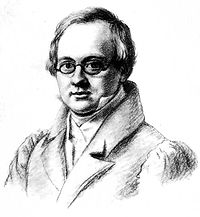
Anton Delwig
Encyclopedia


Baron
Baron is a title of nobility. The word baron comes from Old French baron, itself from Old High German and Latin baro meaning " man, warrior"; it merged with cognate Old English beorn meaning "nobleman"...
Anton Antonovich Delvig ' onMouseout='HidePop("89082")' href="/topics/Moscow">Moscow
Moscow
Moscow is the capital, the most populous city, and the most populous federal subject of Russia. The city is a major political, economic, cultural, scientific, religious, financial, educational, and transportation centre of Russia and the continent...
- , St. Petersburg
Saint Petersburg
Saint Petersburg is a city and a federal subject of Russia located on the Neva River at the head of the Gulf of Finland on the Baltic Sea...
) was a Russia
Russia
Russia or , officially known as both Russia and the Russian Federation , is a country in northern Eurasia. It is a federal semi-presidential republic, comprising 83 federal subjects...
n poet
Poet
A poet is a person who writes poetry. A poet's work can be literal, meaning that his work is derived from a specific event, or metaphorical, meaning that his work can take on many meanings and forms. Poets have existed since antiquity, in nearly all languages, and have produced works that vary...
and journalist
Journalist
A journalist collects and distributes news and other information. A journalist's work is referred to as journalism.A reporter is a type of journalist who researchs, writes, and reports on information to be presented in mass media, including print media , electronic media , and digital media A...
who studied in the Tsarskoye Selo Lyceum
Tsarskoye Selo Lyceum
The Imperial Lyceum in Tsarskoye Selo near Saint Petersburg also known historically as the Imperial Alexander Lyceum after its founder the Emperor Alexander I with the object of educating youths of the best families, who should afterwards occupy important posts in the Imperial service.Its...
together with Alexander Pushkin, with whom he became a close friend. Pushkin dedicated a poem ('O, Delvig') to him. Delvig commissioned a portrait of Pushkin from Orest Kiprensky
Orest Kiprensky
Orest Adamovich Kiprensky was a leading Russian portraitist in the Age of Romanticism. His most familiar work is probably Alexander Pushkin's portrait , which prompted the poet to remark that "the mirror flatters me".- Biography :...
which Pushkin bought from Delvig's widow after his friend's death.
In his poetry, Delvig upheld the waning traditions of Russian Neoclassicism
Neoclassicism
Neoclassicism is the name given to Western movements in the decorative and visual arts, literature, theatre, music, and architecture that draw inspiration from the "classical" art and culture of Ancient Greece or Ancient Rome...
. He became interested in Russian folklore
Folklore
Folklore consists of legends, music, oral history, proverbs, jokes, popular beliefs, fairy tales and customs that are the traditions of a culture, subculture, or group. It is also the set of practices through which those expressive genres are shared. The study of folklore is sometimes called...
and wrote numerous imitations of folk songs. Some of these were put to music by the composers Alexander Alyabyev
Alexander Alyabyev
Alexander Aleksandrovich Alyabyev, also rendered as Alabiev or Alabieff was a Russian composer. He wrote seven operas, twenty musical comedies, more than 200 songs, and many other pieces. His most famous work is The Nightingale, a song based on a poem by Anton Delvig. It was composed while...
and Mikhail Glinka
Mikhail Glinka
Mikhail Ivanovich Glinka , was the first Russian composer to gain wide recognition within his own country, and is often regarded as the father of Russian classical music...
.
As a journalist, Delvig edited the periodical Northern Flowers
Northern Flowers
Northern Flowers was a Russian language literary almanac published yearly in Saint Petersburg from 1825 to 1832. The full title in Russian was Северные цветы, собранные бароном Дельвигом Northern Flowers was a Russian language literary almanac published yearly in Saint Petersburg from 1825 to 1832....
(1825–1831), in which Pushkin was a regular contributor. In 1830–1831, he co-edited with Pushkin the Literaturnaya Gazeta
Literaturnaya Gazeta
Literaturnaya Gazeta is a weekly cultural and political newspaper published in Russia and Soviet Union.- Overview :...
(1830–1831), which was banned by the Tsarist government after information laid by Faddei Bulgarin
Faddei Bulgarin
Faddey Venediktovich Bulgarin , was a Polish-born Russian writer and journalist whose self-imposed mission was to popularize the authoritarian policies of Alexander I and Nicholas I.-Life and career:...
.

